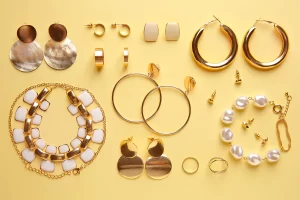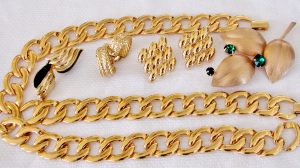How To Choose Jewelry for Sensitive Skin in 2023
Jewelry may be a lovely and important complement to any ensemble, but wearing jewelry can be difficult for those with sensitive skin. Certain metals can cause sensitive skin to react, resulting in irritation, redness, and even allergic responses. If you have delicate skin, it’s crucial to select jewelry that won’t irritate it. We’ll talk about how to pick jewelry for sensitive skin in this post.
Even if you have never had an allergic response before, there is still a possibility that you might acquire some kind of sensitivity to jewelry at some point in your life. This could include severe bouts of dermatitis or eczema or even a newly created allergy.
Nickel allergies may be pretty frequent when it comes to jewelry, and you can determine whether or not you have a nickel allergy by observing whether or not your skin develops a rash in the areas where you wear jewelry.
If the item of jewelry includes nickel or copper, your skin may still become irritated by it even if you have worn it previously and even if it is the same piece of jewelry.
It is possible for any type of skin irritation to occur as a result of:
- Rash
- Swelled skin
- Blisters (acute dermatitis)
- Area of the skin that is pigmented (chronic dermatitis)
- It is possible that you developed dermatitis on your hands in addition to the areas where you wear your jewelry since you handled the jewelry.
Top 10 Best Jewelry Options for Sensitive Skin in 2023
1. Testing for Sensitive Skin
A skin test administered by a dermatologist can definitively tell you whether or not you are sensitive and allergic to the various types of metals that are used in the production of jewelry.
The patch test is an extremely frequent diagnostic method for skin allergies and dermatitis. A patch containing a number of different extracts, any one of which may be the cause of dermatitis, is placed on the skin and allowed to remain there for forty-eight hours.
When the allotted time has passed, a medical professional examines the skin to assess how the patch has affected it.
You may also try wearing the piece of jewelry nonstop for a few days if you want to have a better idea of how it will react with your skin. This is a good idea especially if you aren’t totally sure how it will react.
If you are short on time and would feel more at ease conducting the test in the comfort of your own home rather than going to the doctor, another option is to check into purchasing a home test kit.

2. Be Aware of Your Mental Allergies
To choose jewelry for sensitive skin, you must first be aware of your metal sensitivities. Nickel, which is frequently used in jewelry, causes allergies in the majority of persons with sensitive skin.
Copper, brass, and a few varieties of gold are other metals that can trigger reactions. You can seek testing from an allergist if you’re unsure of which metals you’re allergic to.

3. Don’t Use Base Metals.
Nickel, copper, and brass are common base metals used as the foundation for plated jewelry. Plating is the process of applying a coating of one metal to the surface of another metal.
Although plated jewelry may be more reasonably priced, it is not advised for those with sensitive skin. Over time, the plating may deteriorate, exposing the base metal and setting off a reaction.
4. Look for Metals that are Hypoallergenic.
- Metals that are hypoallergenic are less likely to aggravate those with Jewelry for sensitive skin. Metals that are hypoallergenic include:
- Titanium is a strong, lightweight metal that is frequently used in jewelry. It doesn’t contain nickel and is nickel-free.
- Surgical stainless steel is a premium steel that is utilized in medical equipment.
- It doesn’t contain nickel and is nickel-free.
- Platinum is a rare, expensive metal that doesn’t contain nickel and is hypoallergenic.
- A sort of gold that is 75% pure is 18k gold. Compared to 14k or 10k gold, which includes more base metals, it is less likely to induce a response.

5. Select Solid Gold
Compared to gold-plated jewelry, solid gold jewelry is less likely to trigger an allergic response. Look for 18k or 24k gold when purchasing gold jewelry. These kinds of gold are purer and have less trace metals.
6. Do not wear Costume Jewelry.
Costume jewelry is frequently created using inexpensive materials and may include basic metals like nickel, copper, and brass. Costume jewelry is not advised for those with Jewelry for Sensitive Skin, despite the fact that it can be a fun and inexpensive alternative.
Think about pearls and gems
People with sensitive skin should consider pearls and gemstones. They are less likely to set off a reaction because they don’t contain any metals. Look for high-quality stones when selecting pearls and jewels, and stay away from those that have undergone chemical treatment.
7. Select Silicone Jewelry.
People with Jewelry for sensitive skin have a lot of options, including silicone jewelry. It is free of metals and hypoallergenic. Additionally, lightweight and robust, silicone jewelry is a fantastic option for those who are active.
8. Avoid Traditional Fashion
Cheap, low-quality jewelry that is frequently part of fashion fads can irritate the skin of those with sensitive skin. Choose jewelry that is timeless and constructed of high-quality materials by looking for traditional styles.
9. Test before Purchasing
You can try a piece of jewelry before purchasing it if you’re unclear whether it will trigger a reaction. Wait for a reaction when you rub the jewelry against a tiny patch of flesh on your wrist or neck. The jewelry is probably safe to wear if there is no response after a few hours.

10. Ensure the Safety of Your Jewelry
The likelihood of an adverse response can be decreased by maintaining your jewelry. Regularly clean your jewelry with a gentle cloth and mild soap.





Leave a comment